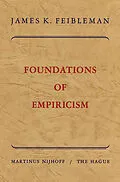For some centuries now the western world has endeavored to choose between rationalism and empiricism; or, when a choice was found impossible, somehow to reconcile them. But the particular brands of both which were taken for granted in confronting the problem were sUbjective: individual human reasoning stood for rationalism and private sense experience for empiricism. Since Plato it has been known that reasoning and feeling are often in conflict. No wonder that a standard for deciding between them or for harmonizing the two was found difficult to come by. Fortunately, due to the revival of realism, a way out presented itself, and we could now consider rationalism and empiricism on some kind of objective basis. In other words, rationalism is a theory about something outside us, and reasoning involves the utilization of a logic which in no wise depends upon our knowledge of it. Similarly; sense experience reveals the existence of data which can be reached through the senses but which in no way relies upon experience for its existence. Thus both reasoning and sensing bring us fragmentary news about an external world which contains not only logic and value but also the prospects for their reconciliation. The implicit philosophy of nominalism is self-liquidating. Where is the proposition which asserts or takes for granted the sole reality of actual physical particulars to get its reality? The meaning of it as a proposition has no place among the particulars.
Inhalt
I. An Introduction to Metaphysics for Empiricists.- One. Categorematics.- II. On the Topics and Definitions of the Categories.- (1) The Number and Source of the Categories.- (2) A Sample of the Range of Categories.- (3) The Problem of Definition: Plato.- (4) The Problem of Definition: Aristotle.- (5) The Categories Analyzed in Definitions.- III. Some Typically Selected Categories.- (A) On the Universal.- (B) On the Individual.- (C) On Substance.- (D) On Quality.- (E) On Relations.- (1) Unary Classes and Unique Members.- (2) Class and Members.- (3) Membership and Inclusion.- Two. Axiomatics.- IV. On the Theory of Induction.- (1) Induction and Probability.- (2) Logical Induction, Emperical Probability.- (3) Phenomenological Bearings.- (4) Problems in Scientific Induction.- (5) General Conclusions.- V. On the Connections Between the Two Worlds.- VI. A Logically Primitive and Empirically Verifiable Ontology.- VII. Propositions and Facts.- (1) Introduction.- (2) Epistemology.- (3) Independence and Overlapping.- (4) Propositions Alone.- (5) Facts Alone.- (6) Propositions and Facts Together.- (7) The Methodology Required.- (8) Properties of Systems.- Three. Systemics.- VIII. The Domain of Finite Ontology.- (1) Categorematics.- (2) Axiomatics.- (3) Systemics.- (4) Ethics.- (5) Practics.- (6) Histories.- (7) Epistemics.- IX. The Range of Dyadic Ontology.- (1) Ontologies of the Pure Type.- (2) Variations of the Pure Type.- (3) Variations of the Mixed Type.- (4) The Structure of Intensity.- Four. Ethics.- X. An Objective, Empirical Ethics.- (1) Ethics as a Field of Inquiry.- (2) Empirical Elements: The Objects Named.- (3) Empirical Structure: The Names Combined into Elementary Propositions.- (4) Logical Elements: The Elementary Propositions Combined into Complex Propositions.- (5) Mathematical Structure: The Complex Propositions Translated into Axioms.- (6) Applications.- XI. Ethical Variations on a Theme by Rosmini-Serbati.- XII. The Ethics of Action.- Five. Practics.- XIII. The Rational Unconscious.- XIV. Culture as Applied Ontology.- XV. Toward an Analysis of the Basic Value System.- XVI. The Natural Society.- XVII. Language and Metaphysics.- SIX. Historics.- XVIII. History of Dyadic Ontology.- (1) Introduction.- (2) The Orphic Theogony.- (3) The Pre-Socratic Dichotomy.- (4) The Platonic Synthesis.- (5) The Speusippian Excess.- (6) The Aristotelian Correction.- (7) The Idealistic Restoration.- (8) The Nominalistic Reaction.- (9) The Realistic Equilibrium.- (10) The Realistic Exploration.- (11) Conclusions.- XIX. Aristotle as Finite Ontologist.- XX. Kant and Metaphysics.- Seven. Epistemics.- XXI. The Range of Sensational Epistemology.- XXII. Knowing About Semipalatinsk.- XXIII. An Ontology of Knowledge.- (1) The Appearance of Knowing.- (2) Knowledge's Ontological Status.- (3) Ontological Aspects of Language Systems.- (4) Ontological Structure.
